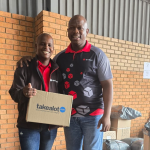There was a countrywide sigh of relief when President Cyril Ramaphosa announced a reduction in lockdown restrictions from Level Five to Level Four from the beginning of May 2020. But, for employers and for those hoping to return to work, what does the Level Four lockdown restrictions mean? And how do businesses ensure they comply with all health and safety requirements?
Although Level Four is somewhat less restrictive, it still doesn’t mean that it will be “business as usual”. Extensive measures will have to be implemented to safeguard workers from exposure to the coronavirus and social distancing will remain a vital safety element.
Going to Level Four means that the country will begin to slowly move away from a scenario that adopted drastic measures to save lives and contain the spread of the virus. Instead, South Africa will now return to some form of normality with the phased resumption of kick-starting the economy. Businesses will, however, have to adhere to stringent Occupational Health and Safety (OHS) measures in the workplace to contain transmission and the spread of the coronavirus.
Assessing the risks
Assessing the risks of the workplace environment has never been more crucial than now for all industries returning to work. A Health and Safety Risk Assessment can play an integral part in complying with legislation rules and regulations required by the OHS Act.
Risk Assessments, as well as health and safety in the workplace, is an unending challenge. It requires a thorough understanding of all relevant legislation and the involvement of specialists, such as Makrosafe.
To ensure employee safety, the OHS consultancy, Makrosafe has a risk assessment procedure in place to control, identify and manage risks and hazards in the workplace. Makrosafe has drafted well-defined protocols for their assessors to examine risks in the workplace and to identify all issues that pose a threat to that business and the employees.
Employers need to adhere to health and safety protocols to protect workers from infection and to prevent the spread of the coronavirus in the workplace.
Who will return to work?
In terms of the Government’s draft for a “risk-adjusted strategy for economic activity”, Level Four allows for the following sectors to return to work:
- Agriculture
- Vintners – winemakers
- Mining (open-cast)
- Financial institutions ( Johannesburg Stock Exchange will remain open )
- Professional services
- Postal and telecommunications
- Forestry, pulp and paper
- Global export market services
- Formal waste recycling
- Taxis (subject to strict passenger-loads and hygiene protocols)
Those sectors of the industry that are allowed to return to work are still subject to final approval. The President’s cabinet ministers will outline the decisions on which sectors can resume activity following a final round of consultations with various industry leaders.
Work from Home to be encouraged
The President has also stressed that businesses must encourage a “work from home” policy wherever possible. No doubt this will apply to employees in the financial and professional arenas where admin staff, who can work remotely, must be encouraged to do so.
Working from home presents challenges
Working from home has presented unforeseen challenges for businesses, workers and the economy in general. Employers, new to the remote work from home scenario, have to face fears such as lack of productivity by employees working out of sight and without direct supervision. But studies have shown that remote workers are more productive in their home environment. According to a study by researchers at Stanford University, productivity levels increased because remote workers were subjected to fewer interruptions, such as chatting with colleagues and attending staff meetings.
Studies have also found that employees suffered less stress by no longer having to cope with commuting, and enjoyed an improved work-life balance because of the flexibility offered by managing their time. The independence of working from home helps employees to develop new skills such as improved concentration and focus, using remote technology, time-management, self-motivation and self-discipline.
At the other end of the scale, employers can develop metrics and measurable goals for work to be performed remotely. It can also help them to improve communications and technological capabilities.
Safety compliance and the SafetyWallet
Makrosafe has the solution for companies launching a working from home policy. Combined with its streamlined and constantly upgraded services to improve the culture of health and safety throughout the South African industrial sector, members also have free access to a secure online database, named SafetyWallet.
This is a user-friendly online service that provides clear guidelines on how to achieve health and safety in the workplace, including working from home. Occupational Health and Safety legislation is programmed into the app and covers all aspects of the OHS Act. All information on this platform is updated weekly. With the help of the SafetyWallet, clients are guaranteed compliance with all OHS Act health and safety regulations while working from home.
Free work-readiness kit
To help businesses meet the challenges of COVID-19, Makrosafe has drafted a free Workplace Readiness Health and Safety Kit. The kit includes the following protocols:
- COVID-19 Policy
- Personal Protective Equipment (PPE) Policy
- Testing / Screening of Employees for COVID-19 Policy
- Working from Home Policy
- Working from Home Risk Assessment
- Travelling to and from Work using Public Transport Risk Assessment
- Workplace Risk Assessment – Exposure to Infections Diseases
- Workplace Readiness after Lock Down
- Control measures Guidelines
- E-Learning (unlimited) – Managing Infectious Disease in the Workplace – COVID 19
- Induction Booklet
- Toolbox Talks
- Awareness Posters
- Daily Mandatory Checklist
Makrosafe Risk Assessments
The consultancy’s risk assessments include:
- The implementation of control measures to safeguard health and safety
- Legal appointments
- Safe Operating Procedures (SOP’s)
- Health and Safety Policies and Procedures
- Health and Safety Training
- Occupational Hygiene Surveys
- Occupational Health (Medicals) and Permits
Risk Assessments are managed and supported by a state-of-the-art management system which ensures that Health and Safety programmes operate at optimal levels. DM
Visit our website now for more details – https://www.safetywallet.co.za/



















 Become an Insider
Become an Insider